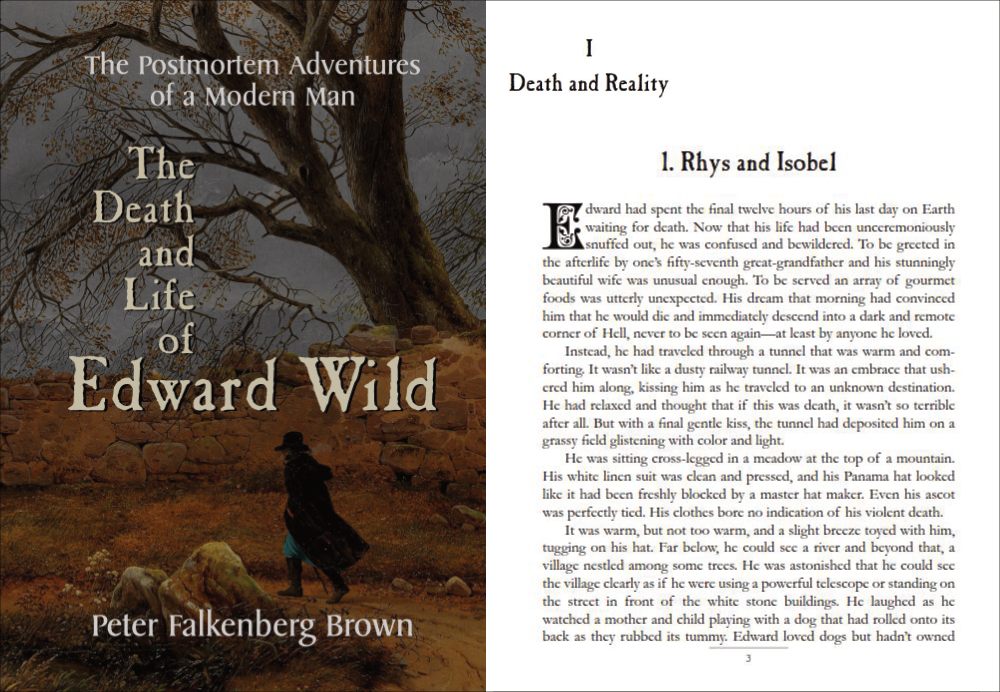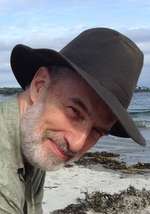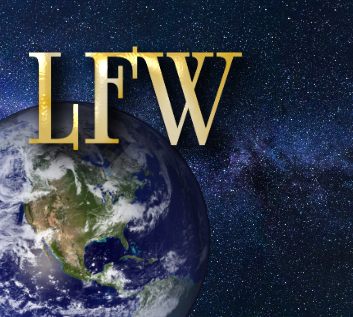To introduce readers to my new novel, I'm publishing the first chapter online. :-) Read it, get hooked, buy the book, tell your friends, leave a review on Amazon, help it go viral and sell millions of copies, and then tell your friends, “I read it before it was famous.” :-) Isn't imagination wonderful?

I
Death and Reality
1. Rhys and Isobel
Edward had spent the final twelve hours of his last day on Earth waiting for death. Now that his life had been unceremoniously snuffed out, he was confused and bewildered. To be greeted in the afterlife by one’s fifty-seventh great-grandfather and his stunningly beautiful wife was unusual enough. To be served an array of gourmet foods was utterly unexpected. His dream that morning had convinced him that he would die and immediately descend into a dark and remote corner of Hell, never to be seen again—at least by anyone he loved.
Instead, he had traveled through a tunnel that was warm and comforting. It wasn’t like a dusty railway tunnel. It was an embrace that ushered him along, kissing him as he traveled to an unknown destination. He had relaxed and thought that if this was death, it wasn’t so terrible after all. But with a final gentle kiss, the tunnel had deposited him on a grassy field glistening with color and light.
He was sitting cross-legged in a meadow at the top of a mountain. His white linen suit was clean and pressed, and his Panama hat looked like it had been freshly blocked by a master hat maker. Even his ascot was perfectly tied. His clothes bore no indication of his violent death.
It was warm, but not too warm, and a slight breeze toyed with him, tugging on his hat. Far below, he could see a river and beyond that, a village nestled among some trees. He was astonished that he could see the village clearly as if he were using a powerful telescope or standing on the street in front of the white stone buildings. He laughed as he watched a mother and child playing with a dog that had rolled onto its back as they rubbed its tummy. Edward loved dogs but hadn’t owned one for years. His life as a stage actor and theater owner in Greenwich Village hadn’t lent itself to puppies.
Edward felt bemused as he gazed at the meadow sloping down to the village. The grass on the hillside was long, around four feet high, with tassels on the tops, waving gently in the breeze. It created a shimmering effect that was mesmerizing, almost like a hypnotist’s pendulum. He put his elbow on his knee and his chin in his hand and breathed slowly as he stared at the grass.
His death had been traumatic, and the twelve hours leading up to it had been grim and exhausting. Yet here he was, bathed in a warm wind mixed with the scent of wildflowers scattered across the meadow, caressed by the vibrations of an orchestra of sounds from crickets and bees, from mockingbirds and grosbeaks, from a land that was reverberating with life.
He sighed once and then again. He could feel his stress dissolving into the air around him, floating away on the breeze. He had no idea where he was, but it most definitely was not the heat-baked asphalt of Manhattan.
He watched an ant crawling across his knee and thought, “How curious. An ant.” He didn’t brush it away. He simply looked at it, wondering where it was headed. Did it have a name? A family? It crawled down his pant leg and over his shoe onto the grass and disappeared behind a leaf. He was surprised by his feelings of affection for the ant and waved his fingers at it, murmuring, “Goodbye, ant.”
Edward found his dreaminess perplexing. Was it a by-product of death? And where was he exactly? His intense feeling of relaxation was replaced by curiosity just as a polite cough entered his awareness. He turned to his left and saw a man and woman standing next to him. Edward scrambled to his feet in surprise.
“Oh, hello again.”
He had met the man after he had died, just before he entered the tunnel. The man smiled and said, “Hello, Edward. I’m Rhys, and this is my wife, Isobel.”
“You know my name?”
“Of course,” Rhys replied.
Edward held out his hand, but they stepped forward and greeted him with the kind of embrace that one gives a relative who had been lost in the Amazon for decades. Isobel kissed his cheek and looked at him with so much love that he started to blush, partly from shyness but mostly because he didn’t remember when he had seen a woman that matched her beauty.
She was tall, around five-ten, with magnificent auburn hair that flowed in curls to her waist. She was wearing a white lace gown that accentuated a voluptuous and athletic body that was not at all ordinary. Her features were a sculptor’s dream, with a nose that was strong, giving her a regal air. Her green eyes were kind and empathic, and her lips were full and generous. She was the kind of gorgeous, warm-hearted woman that would make many men faint.
Edward was in awe and glanced at Rhys, who was grinning at him.
“Yes, my wife makes me faint too.”
“How did you know?” Edward asked, blushing even more.
Isobel touched his forehead. “We read your thoughts, dear.”
“Oh,” he replied. “Really? I didn’t mean to be rude, but I always notice people’s heights and how they look and what they wear and how they talk because I run a theater. I’m always on the lookout for new actors.”
“It’s perfectly fine,” Isobel said. “But come. Let’s eat.”
She turned and pointed at a section of grass a few feet away, facing the village, and waved her hand. A tablecloth appeared on the grass, covered with plates of food and pitchers of drinks. She sat down on the cloth and beckoned to them.
“Come, sit.”
Rhys grinned at Edward again and took his arm as they sat down. Isobel handed Edward a glass filled with a pale-yellow liquid. He sipped it and was immediately filled with a rush of energy—and something more. He was searching for a word for what he felt as Isobel watched him.
“Sparkliness,” she said.
“Yes!” replied Edward.
As Edward sampled the dishes spread across the cloth, Rhys and Isobel introduced themselves. When Rhys said he was Edward’s fifty-seventh great-grandfather, Edward laughed. “Really? How old are you? When were you born?”
Rhys rubbed his nose thoughtfully. “Well, let’s see. By the modern calendar, I was born in Wales in the year of our Lord, 502, so I’m now over fifteen hundred years old.” He looked at Edward slyly. “Do I look it?”
Edward shook his head. “No, not at all.”
In fact, both of them looked like they were around twenty-five. Rhys was the same height as Isobel and had long brown hair tied in a ponytail. His eyes were brown and lively, and his face radiated a friendly cheerfulness. He had a straight nose and a high forehead, an easy smile, and a well-balanced, clean-shaven chin. He wasn’t extraordinarily handsome, but he was well put together and had a face that would make anyone feel immediately comfortable. Yet Edward saw something more in his eyes: the quiet strength and confidence of a man who could be trusted in times of danger.
Edward looked at Isobel. “And you?” he asked.
She smiled and said, “I was born in Scotland in AD 957. I married Rhys many years after I arrived here. Even though I’m not your ancient great-grandmother by blood, I feel like I am by marriage.” She looked at Rhys and said, “We got married in 1215, the same year that King John affixed his seal to the Magna Carta.”
It was hard for Edward to wrap his brain around the reality of her words, so he decided to go deeper. “How did you both meet? And with your age difference, how did that work?”
“Age has little significance here since most of us look young,” she replied. “We met during a cliff dive.”
Rhys sipped his drink and said, “Yes. It was a Dive and Dance Festival.”
Edward looked confused and then laughed. “Wait, did you say dive and dance? Or dine and dance? What’s dive and dance?”
Rhys grinned. “It’s a festival we attended back then. You dive, and then you dance. There was a lot of diving off high cliffs, and then after that, there was dancing. Isobel and I love sports, and we were both performing at the festival. We dove off a cliff above the ocean, and after we surfaced in the water below, we said hello. When the diving was over, we decided to dance together.”
“And that was how we met,” Isobel said.
“So you’re professional divers?” asked Edward.
“Oh my, no, laddie,” said Rhys. “That was just for fun. We run a school together. I teach classical literature and the real history of the world, and Isobel teaches music and dance and the healing arts.”
“What about your languages?” Edward asked. “Didn’t you speak some form of ancient Welsh and Gaelic? But your English is modern, although your accents are charming.”
Rhys stopped sipping his drink and said, “You like our accents? I forget we have them. We’ve been here a long time, and our language has changed with the arrival of newcomers. But even so, I could speak Welsh to you now, and you would understand because, in the spirit world, translation happens at the thought level. When we speak, our thoughts go with our words.”
“I’m not sure I understand, but I’ll work on it,” said Edward. He was fascinated by his ancient great-grandparents: by their warmth, their youth after hundreds of years, their beauty, and their obvious goodness. But he still couldn’t shake his feeling that he was doomed.
Looking at them as they were nibbling on a purple fruit that he had never seen before, he said, “I had a terrible dream before I died. Was it this morning?” He shook his head. “I don’t know how time works here. It seems like this morning, but then it became night, and now it’s day again.”
“It’s always daytime here,” replied Rhys. “Unless we request a dome of night to drape around us so that we can see the stars and the moon, which is really great for campfires.”
Isobel handed Edward a piece of the fruit. “We know about your dream. We observed it from here and watched you all day. You don’t have to worry. You’re not going to that awful level of Hell.”
“Am I going to some other level?” asked Edward. “That doesn’t sound good. Can’t I stay here?”
He looked around at the meadow and the village below. He was startled when a shadow moved across the grass. At first, he thought it was a cloud, but when he looked up, he saw that it was some type of flying vehicle. It didn’t have wings like a plane, and it made no sound. It was like an oblong train car but more rounded and delicate. It swept across the meadow and turned right, descending rapidly toward what looked like an ocean.
“Wow,” said Edward. “What was that?”
Rhys laughed. “That was what we, for lack of a better term, call an airship. They’re useful here for traveling in comfort, especially in a group.”
Isobel leaned forward and pointed toward the village. “See? There are many of them flying above the village.”
Indeed there were. Edward watched them as they flitted across the sky above the village. There were small ones that looked like two-seater convertibles and larger ones that could carry many people.
“What makes them go?” he asked.
“They move by the power of thought,” Isobel said. “They avoid collisions because of an unconscious awareness emanating from the people on board.”
Rhys stood up. “We have many ways of traveling here. Let me show you.” He floated up from the ground to a height of twenty feet and waved at them.
“See? We can fly and fly faster than you can imagine.”
He turned and darted away until he was barely a speck in the sky and then was instantly back, sitting on the tablecloth.
He smiled at Edward. “We can think ourselves somewhere, instantly, or we can fly through the air, as I did, and even fly into outer space, where it is warm and we can breathe. Or we can travel in airships as you saw.”
“I’m impressed,” said Edward.
“Everyone is,” Isobel replied. “Everything here is powered by our thoughts and our hearts. Our emotions have an incredible impact on our surroundings.” She reached out and touched his linen jacket.
“Clothing is a great example. We can change our clothing with our thoughts or, if we wish, ask someone to create it for us based on their artistry. Let me show you.”
She studied his clothing and his form and then waved her hand. He looked down, and his linen suit was gone, replaced by a brown monk’s robe. He was astonished and stood up to see it better. And realized that he wasn’t wearing anything under the robe. Nothing at all.
“Umm,” he said.
She giggled. “Oh, you’re thinking of underwear. We don’t wear underwear here because there’s no need. We don’t need to go to the bathroom. Our spiritual bodies process energy completely differently. Even animals don’t eliminate. We have lots of animals and birds in our house, and we don’t have to clean up after them. I’m especially fond of our chipmunk, who eats dinner with us.”
Rhys laughed too and said, “No underwear, and women don’t wear bras because our bodies keep their shape automatically. It’s not like the physical world, with all the stress and aging and wear and tear.”
Edward was bemused. This method was certainly better for costume changes for Shakespearean plays. Rhys heard his thought and waved his hand at Edward, and his robe was gone, replaced by an authentic outfit from the 1500s.
Edward gazed at the ornate design of his tunic and said, “Very stylish, Rhys.”
“I like Shakespeare’s plays,” Rhys said. “He’s also a kind fellow, although that’s not his real name. But he uses it anyway.”
“Now you try it,” said Isobel. “Think of clothing that you would like to wear. Picture it clearly in your mind, and visualize it on your body.”
“Do I have to wave my hand?” asked Edward.
Rhys laughed. “Nope. It all happens in your mind. But in a group setting, most people wave their hand or wiggle their fingers or give some indication that they are the ones who just made the dinner or dessert appear. Otherwise, it becomes confusing if we don’t know who’s doing what.”
Edward thought for a moment, and his costume changed. He was wearing a white shirt with trousers that were colored a bright robin’s-egg blue, tucked into tall riding boots. He had on a dark-brown leather hat and a hooded greatcoat lined with the same shade of light blue as his trousers. He thought again, and a walking stick appeared in his hand. He struck a dashing pose and smiled.
“What do you think? Am I ready for the stage again? My seamstress made this costume for a play I was planning to do.”
Rhys and Isobel hesitated. He saw something in their expressions that he couldn’t quite place.
“It is an excellent choice, Edward,” Rhys said.
“Yes,” Isobel said. “You will need the warm clothing.”
“I’m sorry?” asked Edward.
“We’ll explain soon,” said Rhys.
“Come, sit next to me, Edward.” Isobel patted the ground beside her.
He sat down, placing his walking stick on the grass.
She took his hand. “One more thing, dear. We never invade a person’s thoughts, but we can communicate with telepathy if we wish. We did read your thoughts, but only at the beginning. There is no limitation on distance with telepathy, although it doesn’t work from a lower realm to a higher one, except under certain special circumstances. We also monitor the lower realms for cries of help. But we want to teach you how to communicate with your mind.”
She smiled reassuringly at Edward. “Think of something, and direct your thoughts to me, and I will tell you what you said in your mind.”
Edward grinned and decided on something silly.
“You like popcorn on the boardwalk,” Isobel said. “Yes, that sounds interesting.” She looked at Rhys. “We shall have to try that.”
She turned back to Edward. “Now, I shall think of something and direct it to you. Tell me what I am sending you.”
At first, Edward couldn’t hear or sense anything. Then the words came, whispering into his mind, and then louder and clearer. He brushed his hand across his eyes, surprised at his sudden tears.
“You are saying that you love me.”
“Yes, I am,” said Isobel. “We love you more than you know. You’ve just met us, but we’ve been watching you on Earth for a long time. And we’ve often tried to help you.”
“But why me? And why the two of you?” Edward asked. “I would have thought that my grandparents or ancestors who were closer to my century would have met me. Fifty-seven generations ago is a long time, Rhys, and you must have millions of descendants.”
“You are correct,” Rhys said. “In fact, some say that everyone alive shares a common ancestor as recently as two or three thousand years ago. The math is fascinating. But the real reason we chose you is connected to the mystery of love.”
“Absolutely,” Isobel said. “It’s not just lineage.”
“Here’s an example of how it works,” Rhys said. “The current population of New York City is over eighteen million. What are the chances that you’ll meet anyone in particular? How does it happen? It’s not just mathematical. People are often drawn to each other through mysterious, spiritual factors that they cannot explain. Isobel and I were drawn to you like a single candle flame in the dark. We don’t know why we connected to you, but as soon as we saw you, we loved you.”
Isobel put her arm around Edward. “Yes, we did. And you’ll have a lot of time to meet large numbers of your ancestors and relatives that came here before you. Many of them know about you and have been praying for you and helping you as well. Not just us. And, dear Edward, you need help now. So we’re here.”
He was moved by Isobel’s affection, but he also felt nervous because, even though he could feel their unexpected love, their expressions had changed. They seemed worried and pensive.
Rhys pointed at the meadow and the village below. “Edward, in the spirit world, people live in an environment that reflects their mind and heart. Everyone can grow, so ultimately, our dwelling place and locale can become beautiful over time. But we each start at our own unique place when we come to the spirit world.”
He paused and looked at Edward sympathetically.
“You have something that you have to work out. Because of that, we must take you to a place that’s rather difficult. But you can leave there when you understand and grow more. No one is ever condemned. It’s all based on our internal world.”
Isobel put her hand on his cheek. “We can’t explain any more than that, Edward. It’s something that you’ll have to understand for yourself. But we’re grateful that we were able to greet you when you arrived and be with you for a time. We could do so because you’re a truly kind person, and thus you could come here first.”
She smiled at him and said, “We wanted you to feel our love and know that love awaits you.”
Edward grabbed Isobel’s arm, unaware of the strength of his grip.
“Am I going to Hell?” asked Edward. “I knew it! I knew I was doomed! Am I being punished for something?”
She loosened his grip and shook her head. “No, no, no. You are not doomed. There is no punishment in the spirit world. Never. Everything is based on who we are. You will see.”
As she spoke, an oblong vehicle appeared behind them. It had no wheels or wings and was floating a few inches above the grass. As they all stood, the tablecloth and food disappeared. Rhys picked up Edward’s staff and handed it to him. “You may need this.”
Rhys and Isobel held Edward’s hands as they stepped into the airship. It was tall enough for all of them to stand, but they guided him to a couch that faced forward. The entire craft had windows all around, so he had a remarkable view as they silently ascended into the air. They sat down on the couch, on each side of him, and held his hands as the sunny landscape faded away. They had changed their direction and were descending, somehow, passing through layers of clouds and fog. After what seemed like a long time, they landed at the edge of an island surrounded by a stone wall.
They disembarked, and he shuddered as he looked around. It wasn’t the darkness of Hell, but it was a cold place and lonely with an atmosphere that bothered him. He couldn’t grasp what was wrong with his surroundings, but it seemed that Rhys and Isobel knew something that he did not.
Isobel wrapped her arms around him and kissed his cheek. She placed her hands on his cheeks and gazed at him with her luminous green eyes and smiled at him. He was comforted but worried about the tears in her eyes.
“Edward, it is here that you must search for illumination,” she said.
He didn’t know what she meant, but he tried to smile as she let him go, and Rhys embraced him with a bear hug.
“Be strong, Edward, and think. Look for quiet spots and think.”
“Okay,” Edward replied. A silly answer, but what more could he say?
“Do not forget us,” Rhys said. “When you are ready, call us in your mind, and we will come.”
“How will I know when I am ready?” he asked.
“You will know,” Rhys replied.
Isobel kissed his cheek and hugged him again. “Be strong, Edward.”
They blew him many kisses and smiled and then stepped into their airship and left him. It didn’t fly up as he had thought it might. It simply vanished without a sound.
He was alone. Really alone. There was a path along the edge of some putrescent water on one side and the stone wall on the other. The bushes and trees were scraggly and depressing. A large frog was sitting in the dirt, but as soon as Edward stepped on the path, it glared at him and hopped into the water. He had never seen a frog glare before.
He didn’t know where to go or what was ahead of him, but he couldn’t stay where he was, so he started walking along the path. He was grateful for the warm clothing that he had selected. The chill of the wind was pervasive and unpleasant, and malformed snowflakes were landing on his sleeves. He checked the inside pockets of the coat and was pleased to find a woolen scarf, which he wrapped around his neck and chin. As he adjusted the scarf, he wondered why he had selected such warm clothes. Had Rhys and Isobel known about his costume on Earth and influenced his thoughts, knowing what was ahead of him? He told himself that he would ask them when he saw them again. He grimaced. If he saw them again.
The ship had landed near a corner of the wall that was adorned with a stone lamp post that had no lamp. The wall turned sharply to his right, next to a fetid marsh that was exuding fumes of something unnameable. Beyond the marsh was a lake bordered by mountains.
The path to the right was blocked by bushes, so he used his staff to clear them away. He wasn’t sure, but he thought he saw a snake sliding into the marsh. He shivered and banged his stick against the bushes as loudly as he could. With the path clear, he continued walking until he saw a guard tower.
He approached the tower and stared up at it. It was crumbling and filthy and was entirely unfit for human use. Next to the tower was a small wooden door, and next to the door, fastened to the wall with iron spikes, was a sign that read, “The Village Where Everything Is True.”
The sign made no sense to Edward, so he ignored it and put his hand on the doorknob to push the door open.
A voice spoke from above his head.
“Wait! You cannot enter until I write down your name.”
A short, thin man was leaning out of the tower. He stared at Edward.
“What is your name?”
“Edward. Edward Wild.”
The man scribbled on a pad.
“Another liar. Excellent. Welcome to the Village of Lies. You may enter.”
“I’m not a liar. What are you talking about?” Edward protested.
“Yes, yes, they all say that,” the man said. “Go in.”
Shaking his head, Edward pushed the door open and walked through. In front of him was a crazed, distorted Salvador Dali version of an English village. There were ancient thatch-covered houses next to Dickensian buildings covered with grime and soot, jutting up against Stratford-upon-Avon homes that were crumbling and rotten. Modern twenty-first-century shops stood like smudged punctuation between the older buildings. A Chinese restaurant, a Spanish grocery, an African clothing shop—all sporting pictures on their dirty windows advertising food and wares that looked ancient and unhealthy. A dirt-covered street ran between the houses and shops. There were villagers scattered about, but there was something odd about them.
Edward paused, thoroughly perplexed. Earlier that day, if there were days in the spirit world, he had been alive. What version of Hell was this? If it was Hell. Or a type of hell. It certainly didn’t look like Heaven. The people in the street were poorly dressed, and some looked like they hadn’t bathed for centuries. And why was he here, instead of with Rhys and Isobel, in the resplendent realm above?
How had it come to this? Edward shook his head and wondered if he were dreaming again. His long day of waiting for death had started with a dream. Perhaps he wasn’t dead after all. But if this was a dream, it was the most vivid dream he had ever experienced. The feelings of joy that he had experienced with Rhys and Isobel were dissipating, shoved aside by a rancid atmosphere of depression. He spied a crumbling stone bench to his right, at the edge of the street. He walked to it and sat down, pulling his coat around him, shivering.
As he looked at the villagers and the sad little buildings, he cast his thoughts back to Greenwich Village, to what most assuredly was reality. Perhaps if he remembered the events of the day, he would understand this better. It had all started with that dreadful dream.
- end of chapter one -
To purchase the book, please visit: https://www.amazon.com/dp/B0C5P5L3B6





 Peter Falkenberg Brown is passionate about writing, publishing, public speaking and film. He hopes that someday he can live up to one of his favorite mottos: “Expressing God’s kind and compassionate love in all directions, every second of every day, creates an infinitely expanding sphere of heart.”
Peter Falkenberg Brown is passionate about writing, publishing, public speaking and film. He hopes that someday he can live up to one of his favorite mottos: “Expressing God’s kind and compassionate love in all directions, every second of every day, creates an infinitely expanding sphere of heart.”





